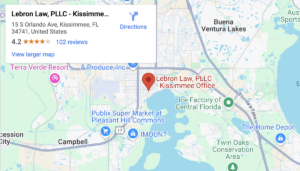Michele A. Lebron | July 14, 2025 | Divorce near Kissimmee, FL

If your marriage is ending or you’re considering your options, you may have heard terms like divorce, dissolution, and legal separation. While these phrases are sometimes used interchangeably in conversation, Florida law treats them differently.
Learning about what each one means can help you decide how to move forward. Each option comes with its own process, legal implications, and emotional impact, so understanding the differences is an important first step.
Divorce in Florida
A divorce is the legal end of a marriage. Florida is a no-fault divorce state, which means you don’t have to prove that either spouse did anything wrong to get a divorce. You only need to show that the marriage is “irretrievably broken.”
When you file for divorce, the court can address a number of legal issues, including:
- Division of marital property and debts
- Alimony (spousal support)
- Child custody (parental responsibility and time-sharing)
- Child support
A divorce can be contested or uncontested. In a contested divorce, the spouses do not agree on one or more key issues, and the judge must make final decisions after a hearing or trial. In an uncontested divorce, both spouses agree on everything and simply ask the court to approve their settlement.
In either case, once the court grants a final divorce judgment, the marriage is legally over, and both spouses are free to remarry.
Dissolution of Marriage
In Florida, the term “dissolution of marriage” is actually the legal name for divorce. When you file papers with the court, you’re filing a “Petition for Dissolution of Marriage.”
There is no practical difference between “divorce” and “dissolution” in Florida. The word “divorce” is commonly used in everyday speech, while “dissolution” is the term used in court documents and legal filings.
Florida law allows for a Simplified Dissolution of Marriage, but only in certain circumstances. This option is available for couples who meet specific requirements, such as having no children, no disputes over money, and a mutual agreement to end the marriage.
A simplified dissolution can be faster and less expensive, but it’s not available to everyone.
Legal Separation in Florida
Unlike some other states, Florida does not have a legal process called “legal separation.” This means you cannot go to court and ask for a judgment of separation or an order to live apart while staying legally married.
However, there are ways to get some of the benefits of legal separation without ending the marriage:
- Postnuptial agreements can outline how property, debt, and support will be handled if the couple lives apart.
- Support unconnected with dissolution is a type of court action that allows one spouse to ask for alimony or child support without filing for divorce.
- Parents can also file for a parenting plan and time-sharing schedule if they want to live apart but remain married.
These legal tools give couples a way to separate their finances or co-parent without going through a full divorce.
Contact the Kissimmee Divorce Lawyers at Lebron Law, PLLC for Help Today With Your Family Law Case
Choosing between divorce and separation is a personal decision that depends on your goals and circumstances. If you are sure that you want to end the marriage and divide your assets, divorce (dissolution) is the clear path forward in Florida.
If you are not ready for divorce but need financial support or want to live apart while remaining married, other legal arrangements may be more appropriate. A family law attorney at Lebron Law, PLLC can help you understand what’s available under Florida law and guide you through the process. Get started by setting up a free consultation today by calling (321) 800-5195.
We serve all through Osceola County and its surrounding areas in Florida. Visit our office at:
Lebron Law, PLLC
15 S Orlando Ave, Kissimmee, FL 34741
(321) 800-5195

